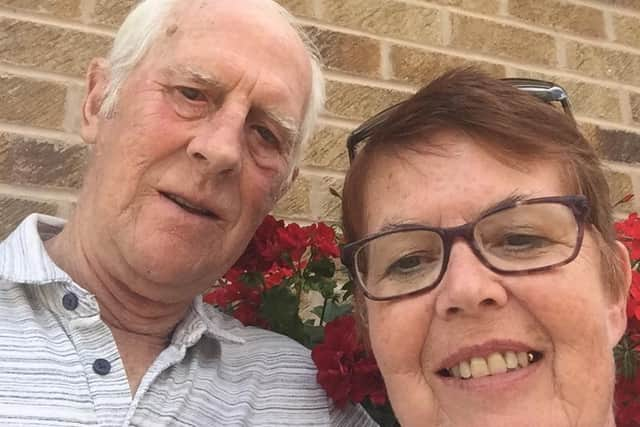World Arthritis Day: Debunking myths about a leading cause of disability in the UK


It’s tempting to dismiss arthritis as just aching joints, and something people must learn to live with as they get older.
But the 10 million people in the UK who suffer from arthritis know that – far from being just a standard part of ageing – the condition can cause excruciating pain and blight the lives of both young and old.
Advertisement
Hide AdAdvertisement
Hide AdAhead of World Arthritis Day on October 12, experts are stressing the importance of busting misconceptions about the condition and the impact it can have – to improve understanding for those affected, and highlight the role of early diagnosis and treatment.


“Around 10 million people of all ages in the UK have arthritis, and it’s the biggest cause of disability in this country,” says Ellen Miller, acting chief executive of the charity Versus Arthritis.
“Yet it’s shrugged off by society because it’s invisible and associated with ageing, thanks to persistent myths about who it affects and what it can do to you. The truth is, an arthritis diagnosis can come at any age and can knock your life for six.”
One person affected is Cynthia Mather, 69, from Leeds, who is retired and lives with osteoarthritis.
Advertisement
Hide AdAdvertisement
Hide AdCynthia was added to the waiting list for a hip replacement at the beginning of March 2021, and her surgery is now scheduled for Friday next week.
The charity Versus Arthritis is in contact with Cynthia after she was involved in testimony for a BBC Panorama, NHS: Wait or Pay?, which revealed that half of people with arthritis and musculoskeletal (MSK) conditions who were waiting for surgery are faced with an average cost of £1,739 a year to keep their pain at bay by paying for private healthcare, physio appointments and over-the-counter painkillers.
Cynthia said: “I have gone from being an active lady who contributed to society to someone who has lost mobility and independence. All it takes is a two-hour operation and I could be back to how I was, instead I am left to hobble about in pain and feeling a burden.
“The personal cost and the cost to society is not recognised and it should be. I finally now have a date and I just hope that this surgery now goes ahead without further delay.”
Advertisement
Hide AdAdvertisement
Hide AdAfter osteoarthritis – or ‘wear and tear’ arthritis, which affects around 8.75m people in the UK – the next most common type is rheumatoid arthritis (RA), an autoimmune condition affecting over 430,000 people in the country. But misunderstandings about the conditions abound. So here, experts debunk some common arthritis myths.
‘Only old people get arthritis’.
Miller says you can get arthritis at any age, even childhood, when it’s called juvenile idiopathic arthritis (JIA). In fact, two-thirds of people with arthritis are under 65 and nearly three million are under 35, she says.
‘Arthritis isn’t serious’.
Arthritis can be devastating, with eight in 10 people experiencing pain every day, explains Miller. “The pain and fatigue steal your independence, ability to work, travel or socialise and make you feel like a burden.”
Jane Barry, medical director of rheumatology at pharmaceutical company Galapagos, says: “One of the symptoms of RA can be joint pain, yes, but the condition can have an effect on other aspects of health, too. In fact, a Galapagos survey last year found one in six people with RA have also been diagnosed with a major depressive disorder.”
Advertisement
Hide AdAdvertisement
Hide AdDue to pandemic disruption in the NHS, Miller says the situation for people with arthritis is at its worst ever, with thousands waiting for trauma and orthopaedic treatment (the vast majority needing hip or knee replacements).
‘Just take paracetamol if your joints ache’.
While it’s common to have occasional aches and pains in the joints and muscles, Miller says it’s important to see a doctor if you have swelling or stiffness that you can’t explain and which doesn’t go away in a few days, if it becomes painful to touch your joints, or if you can’t do everyday tasks because of the pain.
“The earlier you get a diagnosis and find a treatment that works for you, the better the outcome will be,” she stresses.
‘There’s nothing you can do about arthritis’.
Effective arthritis treatments make a huge difference and could prevent irreversible joint damage, says Miller. There’s a variety of treatment options to help people live well with the condition.
‘Avoid exercise if you have arthritis’.
Advertisement
Hide AdAdvertisement
Hide AdIt can be hard to keep moving but staying active, says Miller, can reduce pain and arthritis symptoms, and help people remain independent. Exercise improves muscle strength and keeps joints strong and well-supported, reduces stiffness, helps balance and improves energy levels and tiredness.
‘A Mediterranean diet can cure arthritis’. No diet or supplement will cure arthritis, says Miller, but a balanced diet, exercise, and not smoking or drinking too much alcohol can all have a huge impact.
“Some people find their symptoms are affected by their diet, weight and physical activity levels, but what works for one person may not work for another,” she explains.
‘People understand what rheumatoid arthritis is’.
A 2020 Galapagos survey of people living with RA found 99 per cent felt other people either had a poor understanding of their condition, or confused it for other forms of arthritis.
Advertisement
Hide AdAdvertisement
Hide AdBarry says: “RA is actually an autoimmune condition, meaning the body’s own immune system targets affected joints, which leads to pain and swelling and other symptoms, including fatigue, dry eyes, chest pain and a loss of appetite.”
NHS response
“Caring for more than 450,000 seriously ill Covid patients has inevitably had a knock-on effect on non-urgent care and NHS staff have stepped up and made effective use of additional resources helping carry out millions more tests, checks, treatments and operations this summer compared to last,” said an NHS spokesman.
“The NHS continues to urge anyone who needs the NHS to come forward through NHS 111 Online so that staff can help you with the best option for care.”
The NHS says there were 3.9m diagnostic tests and 2.6m patients started consultant-led treatment over June and July, compared with 2.7m tests and 1.6m treatments over the same time last year.
Comment Guidelines
National World encourages reader discussion on our stories. User feedback, insights and back-and-forth exchanges add a rich layer of context to reporting. Please review our Community Guidelines before commenting.